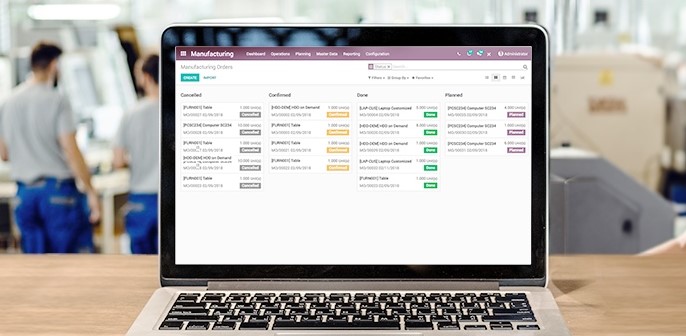Undoubtedly, ERP systems are very helpful for small to large companies to make business more efficient. Especially manufacturing companies, so that collaboration and accurate data from various divisions can be used to achieve the desired targets. No more invalid data and time-consuming manual processes. Now, your team can focus more on getting new business opportunities from clients.
For small to medium-sized companies, implementing an ERP system sometimes feels unnecessary. The hectic daily activities, limited workforce, and challenges finding new clients make them think about switching from old to new systems.
Some businesses may think that if the revenue is still normal, the business is still running, the growth is still there, and the orders are still coming in…why spend time and money on a new system? For those of you who are still reluctant to use an ERP system for reasons of cost, time, and effects that are considered not big, here are 8 reasons why your company needs an ERP system:
1. Want to Improve Business Efficiency
Stock piling up in the warehouse and never selling can be avoided with the help of an ERP system. You can know exactly what stock is needed for each job, and when you need it. It can also automate many inefficient business processes throughout the production chain. This means you can get less data duplication, better production and order scheduling, and significantly reduced downtime.
2. Old system is outdated
Many companies use old systems or working methods because they were once considered successful. However, eventually the system will not be able to replace modern ERP. Old systems can no longer be used due to lack of vendor support, knowledge gaps from old to new users, and limited features to get the information you need. You don’t want to realise this when it’s too late.
3. You Need More Functionality
Conventional systems make it difficult to synchronise data from one department to another. Data input is still manual so it takes a lot of time. Not to mention the human error that affects data validation. You must have an accurate data tracking feature to achieve an accountable business.
Working in the supply chain for large industrial sectors such as automotive, there must be no errors or delays. You need an ERP system to manage stock levels and schedule production to win production or manufacturing contracts in that business sector.
4. Want to Reduce Human Error
ERP systems can help reduce human error significantly. Imagine if you still use the old and manual way of working. Incorrect and inconsistent data will be entered into each system. Unlike ERP, all information is unified and must only be inputted once. The information can be accessed throughout the system and every department now holds the same data.
5. Need Real-Time and Integrated Data

The advantage of an ERP system is that it centralizes all information. You can view KPIs and flag any exceptions. Not only that, you can also conduct investigations because all order information to tax invoicing can be monitored easily.
6. Need ISO Accreditation to Enter New Markets
Certain industries or companies require their suppliers to have quality accreditation. Although getting certain accreditations takes a while, it will be easier if your business has implemented an ERP system. You need an ERP system to ensure end-to-end business processes are standardized and uniform. Inspections can be incorporated into the system to ensure all procedures are followed so that production results remain consistent.
7. Superiors Want to Monitor Field Conditions
As a boss, you must have a lot of work done by your subordinates. However, do you know the current status of the work? An ERP system can track all work, from receiving orders, production schedules, raw material orders, to invoicing. This way, you can easily react to anything in the field.
8. Want the Company to Grow and Have Value
Competing will be very difficult if you still use the old way of working. Business owners who use ERP can create orderly and controlled business processes. ERP systems can reduce inventory, simplify business processes, and speed up workflow in a department. This way, profits are better, business processes are more efficient and competitive.
